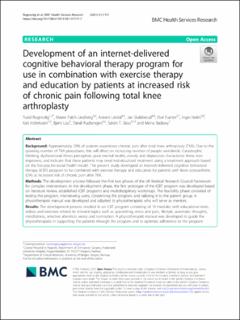| dc.contributor.author | Rognsvåg, Turid | |
| dc.contributor.author | Lindberg, Maren Falch | |
| dc.contributor.author | Lerdal, Anners | |
| dc.contributor.author | Stubberud, Jan Egil | |
| dc.contributor.author | Furnes, Ove Nord | |
| dc.contributor.author | Holm, Inger | |
| dc.contributor.author | Indrekvam, Kari | |
| dc.contributor.author | Lau, Bjørn | |
| dc.contributor.author | Rudsengen, Daniil | |
| dc.contributor.author | Skou, Søren Thorgaard | |
| dc.contributor.author | Badawy, Mona | |
| dc.date.accessioned | 2021-10-28T05:55:53Z | |
| dc.date.available | 2021-10-28T05:55:53Z | |
| dc.date.created | 2021-10-26T15:33:13Z | |
| dc.date.issued | 2021 | |
| dc.identifier.issn | 1472-6963 | |
| dc.identifier.uri | https://hdl.handle.net/11250/2826089 | |
| dc.description.abstract | Background
Approximately 20% of patients experience chronic pain after total knee arthroplasty (TKA). Due to the growing number of TKA procedures, this will affect an increasing number of people worldwide. Catastrophic thinking, dysfunctional illness perception, poor mental health, anxiety and depression characterize these non-improvers, and indicate that these patients may need individualized treatment using a treatment approach based on the bio-psycho-social health model. The present study developed an internet-delivered cognitive behavioral therapy (iCBT) program to be combined with exercise therapy and education for patients with knee osteoarthritis (OA) at increased risk of chronic pain after TKA.
Methods
The development process followed the first two phases of the UK Medical Research Council framework for complex interventions. In the development phase, the first prototype of the iCBT program was developed based on literature review, established iCBT programs and multidisciplinary workshops. The feasibility phase consisted of testing the program, interviewing users, condensing the program, and tailoring it to the patient group. A physiotherapist manual was developed and adapted to physiotherapists who will serve as mentors.
Results
The development process resulted in an iCBT program consisting of 10 modules with educational texts, videos and exercises related to relevant topics such as goalsetting, stress and pain, lifestyle, automatic thoughts, mindfulness, selective attention, worry and rumination. A physiotherapist manual was developed to guide the physiotherapists in supporting the patients through the program and to optimize adherence to the program.
Conclusions
The iCBT program is tailored to patients at risk of chronic pain following TKA, and may be useful as a supplement to surgery and/or exercise therapy. A multicentre RCT will evaluate the iCBT program in combination with an exercise therapy and education program. This novel intervention may be a valuable contribution to the treatment of OA patients at risk of chronic pain after TKA. | en_US |
| dc.language.iso | eng | en_US |
| dc.publisher | BMC | en_US |
| dc.rights | Navngivelse 4.0 Internasjonal | * |
| dc.rights.uri | http://creativecommons.org/licenses/by/4.0/deed.no | * |
| dc.title | Development of an internet-delivered cognitive behavioral therapy program for use in combination with exercise therapy and education by patients at increased risk of chronic pain following total knee arthroplasty | en_US |
| dc.type | Journal article | en_US |
| dc.type | Peer reviewed | en_US |
| dc.description.version | publishedVersion | en_US |
| dc.rights.holder | Copyright The Author(s), 2021 | en_US |
| dc.source.articlenumber | 1151 | en_US |
| cristin.ispublished | true | |
| cristin.fulltext | original | |
| cristin.qualitycode | 2 | |
| dc.identifier.doi | 10.1186/s12913-021-07177-7 | |
| dc.identifier.cristin | 1948596 | |
| dc.source.journal | BMC Health Services Research | en_US |
| dc.identifier.citation | BMC Health Services Research. 2021, 21, 1151. | en_US |
| dc.source.volume | 21 | en_US |

